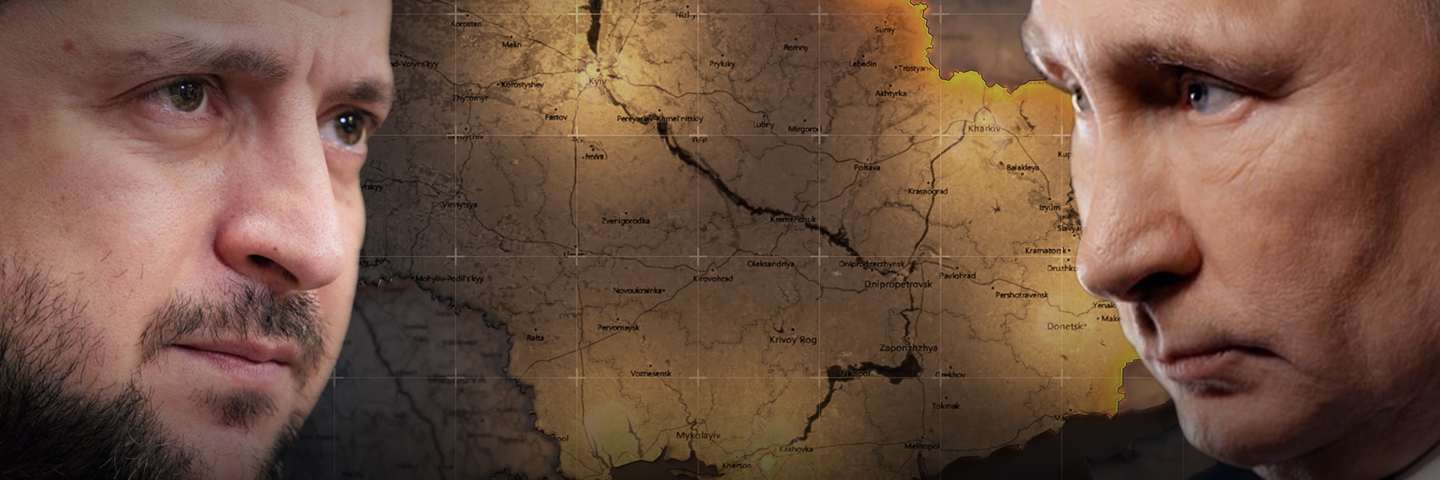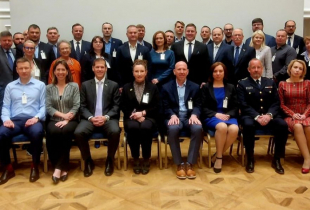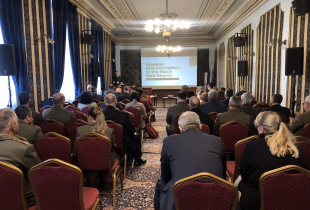
Russia End State: “NATO’s July 9-11, 2024 Washington DC Summit and its Implications?”
Introduction
The United States will host a NATO Summit in Washington DC on July 9-11, 2024. A NATO Summit is effectively a meeting of the North Atlantic Council (NAC), the newly enlarged Alliance’s principal political decision-making body, at the highest level, with 32 Heads of State and Government of NATO member countries invited. Summit meetings provide strategic direction for the Alliance’s activities and, as such, can be used to introduce new policy, invite new members into the Alliance (e.g. the 1997 Madrid and Paris Summits), launch major initiatives (e.g. 2004 Istanbul Summit and 2023 Vilnius Summit) and reinforce partnerships (2010 Lisbon Summit). The Washington DC Summit aims, in the words of NATO Secretary-General Jens Stoltenberg, to “ensure predictable support to Ukraine for the long haul.” What does this entail? What will be the nature of the NATO-Ukraine relationship and what are the implications of this for Ukraine, Russia and NATO?
Ukrainian Swiss Peace Summit and the Washington NATO Summit?
On June 15-16, 2024 over 80 participating countries and international organizations signed a joint communique upholding the principles of “Sovereignty, independence and territorial integrity of all states.” This was not a conventional peace Summit in that Russia was not invited, and both Russia and Ukraine believe that time is on their side and now is not the time for negotiation, especially as both express maximalist demands (de facto capitulation of the other side). Putin’s peace plan which he presented consisted in effect of Ukraine first agreeing to his war aims as a precondition for the start of negotiations - a very Soviet approach. Ukraine seeks a return to its 1991 statehood, as well as reparations and war crimes trials for Russian leaders, first and foremost Putin.
Thus, from a Ukrainian perspective, the purpose of the Summit was not to build momentum around President Volodymyr Zelensky’s Ten-Point Peace Plan, but rather achieve pre-peace positioning that establishes the terms or parameters of an eventual peace negotiation. Rather than all ten points in his plan, Zelensky focused on three - energy security, humanitarian aid and nuclear safety - an agenda that generated consensus and support. In addition, the Summit helped boost President Volodymyr Zelensky's standing and undercut Russian claims that he lacked legitimacy.
From Russia’s perspective, injecting its own peace proposal on the eve of the Swiss Summit, can be understood as an intimidation and warning: agree to our demands now or accept worse terms later. In addition, Russian successfully exerted a large degree of diplomatic pressure on China not to attend the Summit, even to send an observer. Xi Jinping extended a major concession to Putin, and the quid pro quo remains to be seen. Russian reciprocal responses to Kim Jong-Un supplying Russia with artillery shells involve facilitating North Korean satellite launches, the transfer of missile technology and grain. By strengthening links with Pyongyang, Putin plays in China’s backyard, adding to the concessions he must pay to China. Rather than ignoring the Swiss Peace Summit, Putin’s outright opposition to the Summit in the shape of his ultimatum which denied Ukraine’s territorial integrity, information operations and cyber-attacks, only served to undercut Russia’s self-styled “real peace proposal”.
NATO’s July Washington DC Summit falls within a remarkable sequence of recent high-level events – from the 22nd meeting of the Ukraine Defense Contact Group (also known as the Ramstein format) on May 20, to Singapore’s Shangri-La Dialogue May 31 – June 2, the 80th anniversary of the D-Day landings on June 6, the Berlin Recovery Conference (co-hosted by Germany and Ukraine) on June 11-12, on June 13, President Biden and President Zelensky signed a U.S. - Ukraine Bilateral Security Agreement, the G7 Summit in Apulia, Italy, June 13-15, and then, lastly, the Ukraine Peace Summit, June 15-16. The NATO Summit can be understood both as a particular event but also as the conclusion of this sequence. One common feature of these prior meetings was that Putin was not present but Zelensky was and Ukraine itself was offered economic recovery pledges, military aid and political commitments.
All the signs are that in Washington DC Ukraine will be offered additional NATO commitments, including increased NATO interoperability, removing Membership Action Plan requirements and deepening political cooperation in the NATO Ukraine Council, but not NATO membership. The prospect of future Ukraine’s membership “when the time is right” will be clearly messaged (“open door”) and the increased commitments will function as a bridge into NATO. Secretary-General Stoltenberg notes: “At the (upcoming NATO) Summit, I expect other leaders to agree for NATO to lead the coordination and provision of security assistance and training for Ukraine. It is also why I proposed a long-term financial pledge with fresh funding every year. The more credible our long-term support, the quicker Moscow would realize it cannot wait us out and the sooner this war can end. It may seem like a paradox, but the path to peace is, therefore, more weapons for Ukraine.
However, might this “bridge into NATO” and other aid packages, pledges and bilateral security commitments become a compensatory alternative to NATO membership itself? A survey of Ukrainian public opinion undertaken by Carnegie Endowment found that 35% of Ukrainians thought that NATO membership would be offered to Ukraine, 33% believing if membership was not offered Ukraine should try again in the future, but 61% called for looking at alternative means for security. What constitutes a meaningful compensatory alterative to NATO membership remains unclear as only NATO membership and Article 5 have the potential to deter Russia (though Western troops on the ground in Ukraine may also give pause for thought): whereas bilateral commitments and EU membership does not sufficiently “deter by denial” or “deter by punishment”. The tension lies between NATO prepared to increase military aid to Ukraine to end the war, Russia’s awareness that once the war is over NATO membership may be offered (and so the perverse incentive to embrace a long attritional war), and NATO’s “when the time is right” formula. Rather than constructive ambiguity, this context may generate a “stab in the back myth” – the west supported Ukraine with enough materiel so that it could not be outright defeated, but not enough so that it could win.
It is unlikely that the NATO Summit will change Putin’s risk calculus towards Ukraine and the West. Putin believes that in a war of resources (Russia’s economy is ten times that of Ukraine, its population four times larger) and resolve (in his view the West akin to the Soviet Union in 1990, one more push and it collapses, a Trump presidency forces “negotiation” on Russian terms in early 2025), Russia will gain victory through an attritional positional long war. As Ukraine will likely not be offered NATO membership in Washington DC, this may make Putin more enthusiastic and bullish for his current strategic approach, rather than seeing the need for “vertical” or “horizontal escalation”. It remains difficult to discern Putin’s strategic calculus, not least as many of his actions receive the opposite effect of what we presume he intends.
U.S. “Burden Shifting” and NATO:
Under the gradual “burden shifting” scenario, European NATO member states invest more in their own defense industry (but without buying less American weapons to maintain interoperability), secure their neighborhood with support of U.S. “critical enablers” and operate under U.S. “extended deterrence” (nuclear umbrella). In this scenario, NATO is strengthened rather than weakened or replaced.
An alternative vision sees an “America First” Trump administration determined to have the U.S. behave as a normal great power by maintaining U.S. global influence and engagement in a more cost-effective way. This appears externally to be more zero-sum and narrowly self-interested. The U.S. declines to defend global norms, provide public goods and protect distant allies whose survival is not critical to the U.S. Continentalism (“de-globalized defense”) replaces globalism in U.S. strategic thinking.
Trump advocates argue that when the former president states that the U.S. will fundamentally rethink “NATO’s purpose and NATO’s mission” and characterizes NATO as “obsolete” (2016) he knowingly does so to apply pressure to renegotiate “burden sharing” and encourage Europeans to spend more on their own defense. They note that in his first term Trump strengthened NATO’s conventional and nuclear assurances. Michael Kimmage, a Cold War historian who held the Russia/Ukraine portfolio for the State Department during the Obama Administration, argues that Trump may escalate the war to distinguish himself from his predecessors or to strengthen his case for negotiating. Konstantin Sonin, a Russian-born economist and Kremlin critic points to the sheer unpredictability of Trump: “Whatever Trump says now, what he would be saying after, say, five American marines are dead because of a Russian missile in Poland, will be totally different.” Keith Kellogg, a former national security adviser to Trump, suggest that NATO could become a ‘tiered alliance’, in which some members enjoy greater protections based on their compliance with NATO’s founding treaty. Gordon Sondland, Trump’s former ambassador to the EU notes that Trump “does not like Putin at all, and while he compliments Putin publicly, he does it because it’s a contrarian strategy.” He also states: “I think Zelensky should be at Mar-a-Lago and not for a fancy dinner. I think he should show up there in his battle fatigues, and I think he should give Trump [a] very specific anecdotal example-simple, straightforward: “Mr. President, I’ve got a city here. It’s got 100.000 people in it, a lot of women and children. The Russians are this close. I need X, Y, and Z because it’s going to fall. Will you help me with this city? Will you tell your friends in Congress to get me X, Y, and Z to defend this city?” And if Trump asks “what’s in it” for the United States? Sondland advances a compelling Zelensky response tailor-made for Trump: “You may not like us, you may not care about us, but if we fall, you’re going to have a much more expensive mission on your hand, to pick up the pieces, because you can’t exist without Europe.”
However, other former officials who worked with Trump on NATO, highlight the possibility that the rhetoric reflects the reality of policy and predict rapid withdraw from NATO and abandonment of extended nuclear deterrence. In his presidential campaign, Trump encourages Putin to do “whatever the hell they want” to “delinquent” allies that do not pay enough for defense. Why should U.S. tax payers subsidize European defense (population larger than U.S., 2M soldiers, wealthy)? It promotes free riding, weakens NATO deterrence capabilities and so encourages Russia to attack European NATO allies once it has reconstituted its conventional combat capability. If so inclined, in 2025 President Trump could through presidential declaration dramatically weaken even paralyze the institutional basis for U.S. conventional and nuclear assurance to NATO by terminating U.S. defense commitments but remaining a member. Trump could withhold funding, recall U.S. troops and commanders from Europe, including SACEUR, block important decisions in the NAC, withdraw U.S. strategic air transport/air lift capabilities, air-to-air refueling, space observation and communication, high-altitude air defense, space assets, and operational reconnaissance and surveillance and terminate U.S. Ukraine assistance.
In this sense, Trump could be viewed as a catalyst or midwife for collective action and integrated defense based on European conventional military deterrence of Russia “by denial”, and, ultimately if necessary, a pan-European or French/UK extended nuclear “deterrence by punishment” pillar. In this context, Ukraine’s NATO membership might be integral to European security, the answer to both Putin’s undoubted imperial revanchism and Trump’s projected retrenchment from Europe to refocus on China as a near-peer competitor. In the longer-term, Ukraine offers European NATO mass, time and space for it to mobilize. European NATO members can offer Ukraine money ($45 bn/pa), training, and joint arms production to sustain its defense. In the short term, Ukraine using western precision weapons systems and actionable intelligence, can target Russia’s military asses critical to a future war with NATO, assets such as strategic bombers, nuclear radars, and A-50 surveillance planes, which Russia has lost the capacity to produce.
Conclusions
NATO’s Washington DC Summit should be viewed in the context of the collective West’s mobilization to defend Ukraine and deter further Russian aggression. In return for not offering immediate membership, NATO needs to craft a narrative that suggests some form of graduated integrative to membership. Ukraine needs line of sight on membership, intermediate steps – such as a Black Sea Maritime Safety and Security agreement - may further condition and set parameters. By negotiating such agreements with the West, Ukraine narrows the negotiating space for Russia. NATO may face and should embrace an “arc of opportunity” as a number of non-NATO states seek to further enhance relations with but not join NATO, Ireland, Switzerland, Serbia, Moldova, and Armenia.
But abrupt discontinuities will complicate the strategic landscape. In the U.S., constitutional crisis could paralyze the executive and legislative branches; physical infirmity of one or more candidates requiring the hasty substitution of someone new. The gap between public opinion and governmental policy in the West may increase. Alternatively, Putin may breach the limits of Chinese friendship. Former Global Times editor-in-chief Hu Xijin, offered a rare criticism of Putin's demand for Ukraine to cede territories under Russian control, which Putin had made in ceasefire terms announced on the eve of the Swiss summit: “Is it right for Russia to directly mark four Ukrainian states as Russian territory? I do not think so and it is going too far. It is not in line with international law. Sovereignty and territorial integrity should not be violated. We should pay attention to the feelings of the West, especially Europe, and balance relations between China and Russia and between China and the West.”
In addition, a tense and consequential October in the Black Sea region looks likely. Moldova undertakes an EU referendum on October 24, and there are parliamentary elections in Georgia on October 26. If past is prologue, in Moldova Russia’s FSB and/or GRU will attempt a coup in Moldova (as they did respectively in 2022 and 2023). In Georgia, the current government, under the rhetoric and shadow of Russian “defensive reactive” intervention, will refuse to transfer power, declare martial law and accuse the opposition of mounting a western-backed (“Anglo-Saxon” and “CIA-Soros”) “color revolution”. In these contexts, the “horizontal escalation” of Russia’s imperial aggression becomes more certain. NATO’s Washington Summit will be at least aware of such contingencies. The shadow of the future and predictive thinking now shapes strategic thought.
GCMC, Garmisch-Partenkirchen, June 19, 2024
About the Authors
Dr. Pavel K. Baev is Research Professor at the Peace Research Institute Oslo (PRIO). He is also a Senior Non-Resident Scholar at the Brookings Institution (Washington, D.C.) and a Senior Research Associate with the French International Affairs Institute (IFRI, Paris). Dr. Baev specializes in Russian military reform, Russian conflict management in the Caucasus and Central Asia, energy interests in Russia’s foreign policy, and Russian relations with Europe and NATO.
Dr. Mark Galeotti is Director of the London-based consultancy Mayak Intelligence, an honorary professor at the University College London School of Slavonic and East European Studies, a senior associate fellow at the Royal United Services Institute, and a senior non-resident fellow at the Institute of International Relations Prague. He is an expert and prolific author on transnational crime and Russian security affairs. His latest books include: Putin’s Wars, from Chechnya to Ukraine (London: Osprey, 2022); The Weaponisation of Everything: A Field Guide to the New Way of War, 2022 (New Haven and London: Yale University Press, 2022).
Dr. Graeme P. Herd is a Professor of Transnational Security Studies in the Research and Policy Analysis Department at the George C. Marshall European Center for Security Studies. His latest books include Understanding Russia’s Strategic Behavior: Imperial Strategic Culture and Putin’s Operational Code (London and New York, Routledge, 2022) and Russia’s Global Reach: A Security and Statecraft Assessment, ed. Graeme P. Herd (Garmisch-Partenkirchen: George C. Marshall European Center for Security Studies, 2021).
The George C. Marshall European Center for Security Studies
The George C. Marshall European Center for Security Studies in Garmisch-Partenkirchen, Germany is a German-American partnership and trusted global network promoting common values and advancing collaborative geostrategic solutions. The Marshall Center’s mission to educate, engage, and empower security partners to collectively affect regional, transnational, and global challenges is achieved through programs designed to promote peaceful, whole of government approaches to address today’s most pressing security challenges. Since its creation in 1993, the Marshall Center’s alumni network has grown to include over 16,000 professionals from 160 countries. More information on the Marshall Center can be found online at www.marshallcenter.org.
The Clock Tower Security Series provides short summaries of Seminar Series hosted by the George C. Marshall European Center for Security Studies. These summaries capture key analytical points from the events and serve as a useful tool for policy makers, practitioners, and academics.
The articles in the The Clock Tower Security Series reflect the views of the authors (Pavel Baev, Mark Galeotti, and Graeme P. Herd) and are not necessarily the official policy of the United States, Germany, or any other governments.

